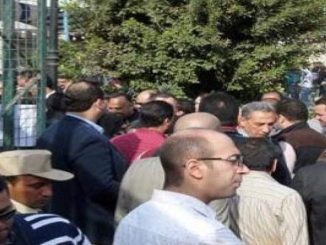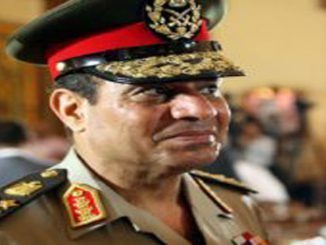
Egypt is witnessing an increase in Labor unrest despite al-Sisi’s government measures to suppress political demonstrations and riots. However, the economic deteriorations and social inequalities due to the rising prices, low wages and delays in salaries and bonuses have agitated workers to vow for more strikes and protests, even at the risk of a violent crackdown.
Last month, workers have held sit-ins at Alexandria’s port and even in Cairo, despite the protest law issued by the al-Sisi government that doesn’t allow protests without permission from the ministry of Interior. According to Democracy Meter, an Egyptian NGO that tracks and verifies protests using multiple sources, thousands protested at a total of 493 actions in the first four months of 2016, a 25% increase compared to the same period a year ago. Mohamed Adel, the director of a Democracy Meter group, said, “Labor tried to give el-Sisi a chance. But you can’t take away peoples’ rights and fail to fix poverty simultaneously.He said the actions range from work stoppages to peaceful marches and pickets. Since the ouster of Mohamed Morsi, the first democratically elected president, Egyptian security forces have waged a relentless crackdown arresting thousands of his Islamist supporters as well as prominent liberal and secular activists. In addition, the Egyptian authorities banned a march on International Workers Day last month organized by independent trade unions; but they have not targeted labor activists with mass arrests, perhaps fearing the consequences.
Hosni Mubarak, the former dictator who ruled Egypt for 30 years before being overthrown by January Revolution 2011, kept a tight lid on labor unrest during his power, permitting only state-controlled unions in a tradition dating back to the days of socialist leader Gamal Abdel Nasser. However, the independent unions began organizing protests last years of Mubarak’s reign, and the workers have played a major role in the 2011 revolution. Therefore, organized labor has been under intense scrutiny by the Egyptian security forces who returned powerful after the 2013 military coup. Even foreigners interested in Labor unions have been put under observation. On the anniversary of January Revolution in 2016, an Italian doctoral student who had been writing his thesis about independent unions was found tortured to death. Giulio Regeni disappeared when security forces were out in the streets of central Cairo. Police have denied any involvement, but the torture on his body has the signs of the Egyptian security forces. Italy withdrew its ambassador, saying Egypt was not fully cooperating in the investigation.
The Egyptian parliament is working on a bill that would delegitimize independent organizations, and a lawsuit was filed by the official state union seeks to criminalize non-official trade unions. Moreover, the government has launched a massive attack against human rights organizations and NGOs efforts to shut down NGOs that receive foreign funding, which could affect unions with links to international labor movements. Many activists were subjected to investigations, travel bans and confiscation of resources in an attempt to limit their activities.
In the same context this week, Egyptian Labor Minister Mohamed Saafan gave a speech at the International Labor Organization’s annual conference in Geneva, but he made no mention of independent unions, focusing instead on state sovereignty and the fight against poverty. The head of the state unions, Mohamed Wahballah, who was also present, described terrorism as the main obstacle to development, according to Egypt’s official news agency, MENA. In response, the independent unions filed a complaint to the body, rejecting Egypt’s delegation at the conference as illegitimate and denouncing what they described as government attempts to “liquidate” them. The ILO said in a report that it was “concerned” about doubts over the official unions’ independence and that Egypt’s delegation did not undertake its obligations as a member.
The head of the independent Center for Trade Unions and Workers’ Services, Kamal Abbas said that he expects more strikes, but not in large-scale demonstrations seen during and after the 2011 uprising. He said, “The government is attacking the independent and professional unions, and the workers are standing up, especially in cases where they are dismissed unjustly or benefits are not paid out.” The Labor unions have a long history in strikes and demonstrations, Misr Spinning and Weaving factory strikes in the town of Mahalla el-Kobra occur several times a year and have turned violent in the past. On April 6, 2008, 20,000 workers sparked the first mass protests against Mubarak, led later to the emergence of a youth movement called April 6 that played a key role in the 2011 revolution. After the coup in 2013, the group has since been outlawed and its leaders were imprisoned. Kamal Al-Fayoumi, a labor activist, said, “Around 10,000 of the factory’s workers are associated with the independent unions, and have long used strikes as their principle means of securing higher wages and benefits. “In addition, the workers also organize demonstrations and strikes through the social media. For many workers, recent price increases driven by double-digit inflation would most probably outweigh the dangers of taking to the streets.”
No one can predict the future, but if prices keep rising, and salaries stay the same, the workers will hold peaceful protests until the salaries match the prices,” al-Fayoumi said. He said that he was fired last year because he had spoken out about corruption that cost the company hundreds of millions of dollars, pointing to a report by Egypt’s top auditor released last year, which reportedly mentioned the factory. The auditor, Hesham Genena, is now on trial for spreading “false news.” Al-Fayoumi was detained by guards for five hours and questioned at the behest of state security about his activism and possible links to foreign funding.
Moreover, the security forces dispersed a sit-in at a shipyard in Alexandria, Egypt’s second city, arresting 13 workers and engineers, who could face military trials since the facility belongs to the navy. According to the director of the Democracy Meter, workers are being held in a military prison on accusations of taking part in unauthorized protests. He said, “They want to show that no one can touch or oppose any kind of militarily installation or property,” adding that he is worried about the future. “When you take bread from my child, I become a monster. I fear it could turn violent.”



